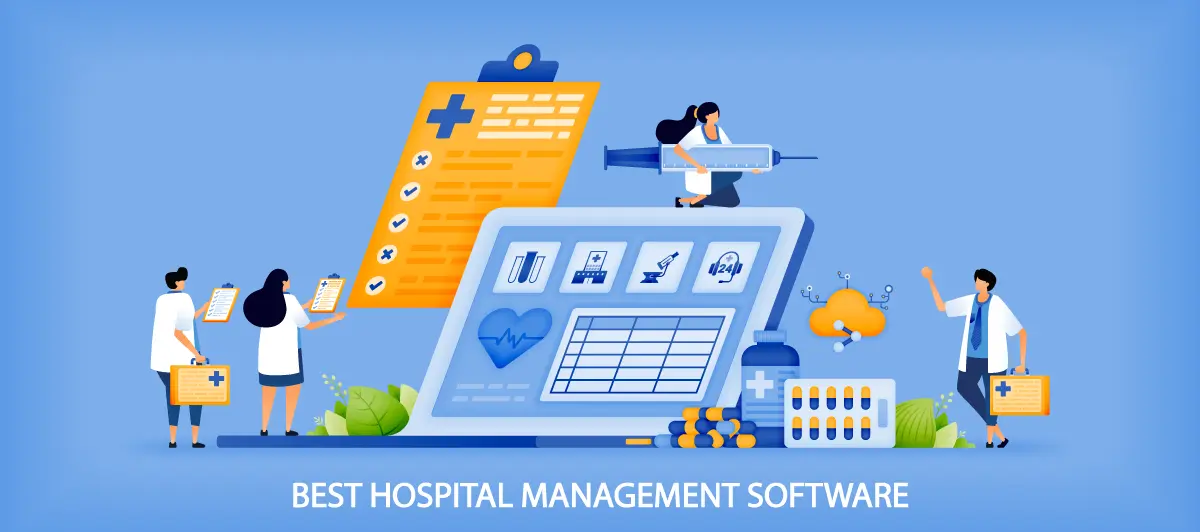Choosing the Best Hospital Management Software: A Comprehensive Guide
Quick Summary: Selecting the best hospital management software is critical for healthcare institutions. This comprehensive guide provides insights and criteria to help healthcare organizations make an informed decision, considering factors such as scalability, integration, security, and user-friendliness, ensuring efficient healthcare management and improved patient care.
Introduction
The most important concern for every hospital is to reassure patients about their well-being and offer them the best treatments. Hence, this can only be possible when the functioning of the hospital aligns with the patient’s demands.
Having the best hospital management software is one of the crucial ways that can enhance the productivity of hospitals. It can do everything from scheduling appointments to informing staff about vacant beds in the hospitals.
As the healthcare industry continues to grow and expand, the need for efficient and effective hospital management software has become more critical than ever. Choosing the right software can make all the difference in streamlining processes, improving patient care, and increasing profitability.
When everything depends upon the credibility of the hospital management software, there’s no way that you can settle for a less efficient solution. But how can you tell which is the best hospital management software? This blog has a list of key considerations that can help you when you are looking for top 10 hospital management software in India or other countries.
What is hospital management software?
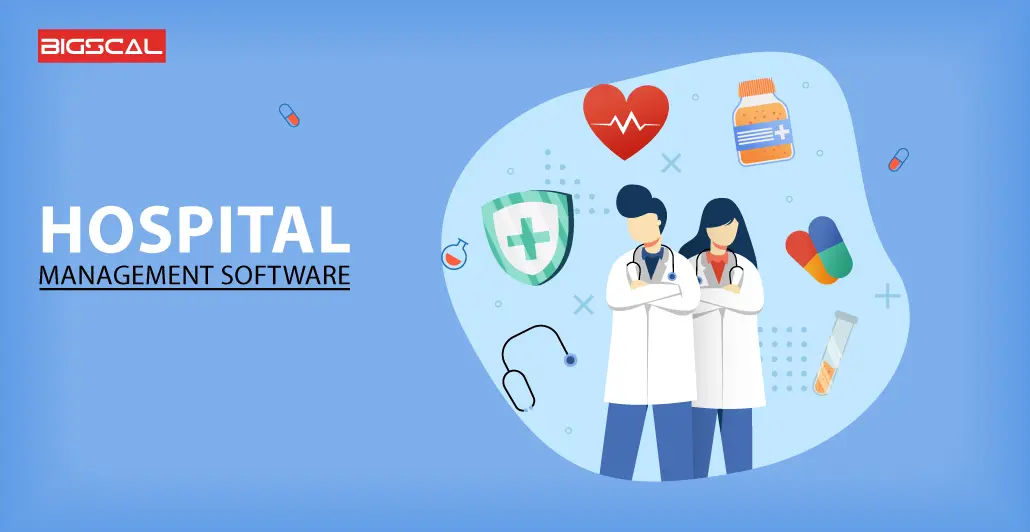
As per reports, healthcare workers tend to spend 35% of their daily time on documentation of patients’ data. Although it’s almost impossible to avoid paperwork, you can automate it and reduce the burden on the doctors and staff.
Not only document and patient record management but there are plenty of other works that happen parallelly in a hospital. Therefore, getting the best hospital management software can manage and process all of them. It can be used to simplify activities such as:
- Managing patient records
- Tracking and managing appointments
- Managing records of staff
- Insurance claims and billing
Hence, hospital manager software can enhance patient care and improve the overall quality of services. Moreover, it can also be employed to minimize operational costs and improve the revenue cycle.
Therefore, hospital management systems can create a frictionless approach that helps in managing hospitals and operational complexities.
The hospital management system is helpful, but it is complex. Hence, to make it easier to understand and implement, they divide it into different modules. Moreover, these modules are built upon the needs of the department and its process. Let’s take a closer look at the benefits and tips to choose the best hospital management software.
Read more: Patient Journey Management Software: Why Hospitals Need It
What are the benefits of hospital management software?
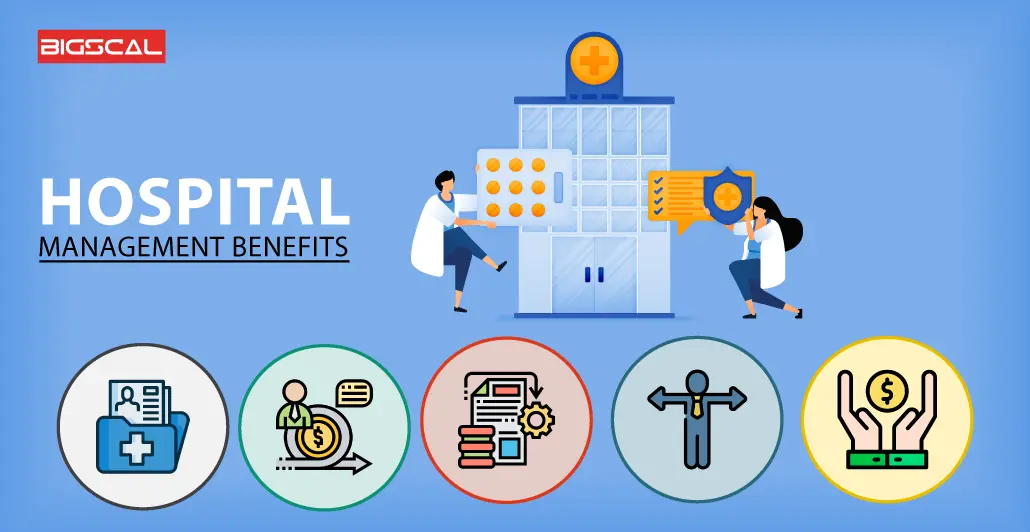
Better patient care
Hospital management software operates in correlation with electronic health records (EHR) to enable healthcare systems to have quick access to patient records. Hence, this will ensure accurate diagnosis and treatment. It lets doctors select a relevant treatment with less chances of human error.
Also, having unified data can reduce the paperwork and administrative burden. Therefore, comprehensive hospital management software can give professionals time to interact with patients.
Moreover, sending timely alerts to the doctors can further enhance the response time to minor and major critical events. It could also help staff to concentrate on their core responsibilities.
Streamlined overall efficiency
Hospital management systems work on data collection and allocation of rational informational resources. Hence, it can smartly distribute information in segments. Having automated data management can eliminate manual data entry, streamline the workflow and minimize patient waiting time.
Hence, in this manner, software used in healthcare services can ensure better satisfaction among patients and can simplify client flow for the medical staff.
Enhanced data processing
The information that hospitals collect from patients is highly sensitive and needs solid cyber protection. As hospital information systems are data-dependent, they should be designed with the best data protection policies.
Healthcare software providers make solutions that follow required regulations such as HIPAA and GDPR to abide by business responsibilities. This method allocates data access according to managerial roles and incorporates state-of-the-art encryption techniques.
Hence, these solutions also offer consistent security updates to hospital staff management, enabling medical organizations to monitor data processing efficiency effective
Smarter decision-making
Timely reports facilitate rapid performance assessment, where data plays a pivotal role in shaping decision-making. When a hospital management system (HMS) efficiently organizes patient data, it empowers healthcare organizations to pinpoint bottlenecks and unearth opportunities for enhancement. Consequently, hospitals gain the ability to make well-informed choices regarding the allocation of internal resources and the optimization of fundamental processes.
Optimized budget
Hospital management software plays a pivotal role in cost reduction through streamlined operations, decreased paperwork, and error minimization. It optimizes resource allocation, efficient scheduling, and inventory management, preventing issues like overstock or shortages. It can also take care of revenue cycle management.
Automated billing and claims processing expedite revenue cycles, while enhanced data analysis empowers informed decision-making, preventing unnecessary expenses.
Ultimately, the implementation of a hospital management software system significantly enhances overall efficiency, and revenue management, leading to reduced operational costs and increased revenue for healthcare institutions.
Read more: How To Create Hospital Management Software: Step-By-Step Guide
Top tips for choosing the best hospital management software
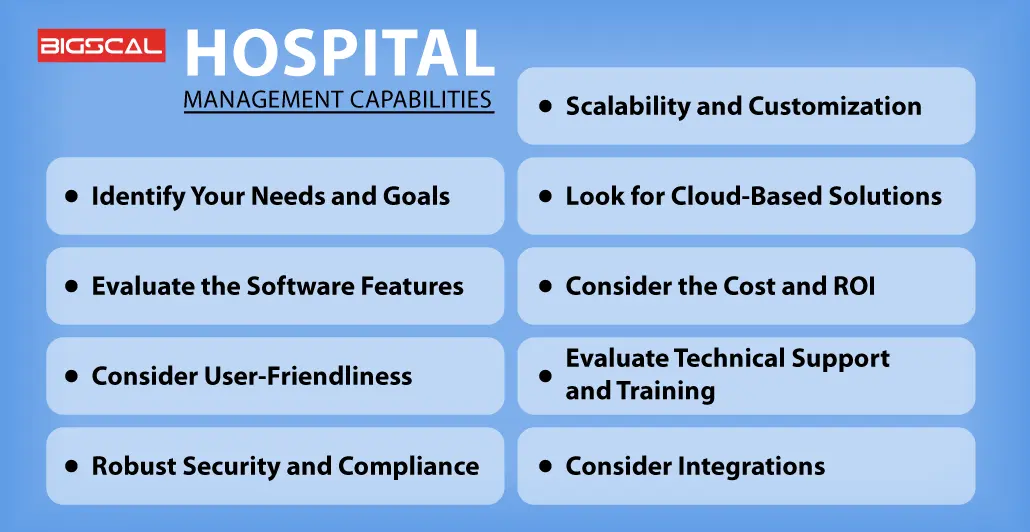
Identify Your Needs and Goals
Prior to choosing hospital management software, it is essential to pinpoint the distinct requirements and objectives. These could encompass tasks such as streamlining patient admissions and discharges to efficient medical record management.
It can also include enhancing inter-departmental communication or optimizing billing and revenue cycle management. Once you have a precise grasp of your goals, you can then focus your search on software solutions.
Evaluate the Software Features
When assessing hospital management software choices, it’s essential to examine the range of features provided by each platform. It can help you whether to choose hospital risk management software or some other solutions. Key elements to prioritize comprise
- electronic medical records (EMRs),
- effective patient scheduling and appointment management,
- efficient inventory and supply chain oversight, and
- robust billing and financial reporting capabilities.
Seek out software solutions that present a well-rounded suite of features tailored to match your healthcare facility’s specific requirements and objectives.
Consider User-Friendliness
One of the key considerations in choosing the best hospital management software is its usability and compatibility. It’s crucial that the software is intuitive, user-friendly, and can be implemented with minimal training. Furthermore, it should seamlessly integrate with existing software systems and technologies used within the healthcare facility.
Robust Security and Compliance
Healthcare institutions are obligated to adhere to stringent data privacy and security standards in safeguarding patient records. When choosing hospital management software, it’s imperative to confirm that the platform provides robust security measures for patient portals, including data encryption, access controls, and audit trails.
Furthermore, the project management software must align with pertinent regulations and standards, such as HIPAA and GDPR, to ensure comprehensive compliance and patient data protection.
Scalability and Customization
As your healthcare institution expands and develops, it’s essential to align your software choices with this growth. When deciding on hospital management software, it’s crucial to evaluate its scalability and customization capabilities. The chosen healthcare management software should demonstrate the ability to adjust and grow in tandem with your facility’s evolving needs and changing requirements.
Look for Cloud-Based Solutions
Cloud-based hospital management software solutions provide numerous advantages compared to traditional on-premise hospital software alone. These benefits encompass increased scalability, enhanced flexibility, and improved accessibility. Cloud-based platforms can be easily accessed from any location with an internet connection, making it particularly well-suited for healthcare facilities with multiple sites or staff working remotely.
Consider the Cost and ROI
However, focusing solely on the cost when choosing the best hospital management software or hospital software tool may not be advisable. Hence, it is crucial to assess the platform’s overall return on investment (ROI). Prioritize software solutions that encompass a wide range of features and deliver tangible advantages. It should be effective in areas like heightened productivity, error reduction, claims management and enhanced patient outcomes. Furthermore, it’s important to factor in any potential expenses related to ongoing maintenance or software upgrades.
Evaluate Technical Support and Training
When choosing hospital management software, it’s crucial to factor in the quality of technical support and training. Opt for a provider that delivers thorough training programs to ensure your team can proficiently utilize the software. Furthermore, assess the provider’s technical support capabilities, ensuring they are capable of promptly delivering effective solutions.
Consider Integration
Many healthcare institutions rely on a combination of software systems to oversee different facets of their operations. These operations include electronic health records, billing tools, and inventory management systems. When choosing hospital management software, it’s crucial to assess its compatibility with these pre-existing systems. Opt for software that boasts effortless integration capabilities, as this will diminish the necessity for manual data inputs. It must also mitigate the potential for inaccuracies.
What Bigscal’s Hospital Management System Offers?
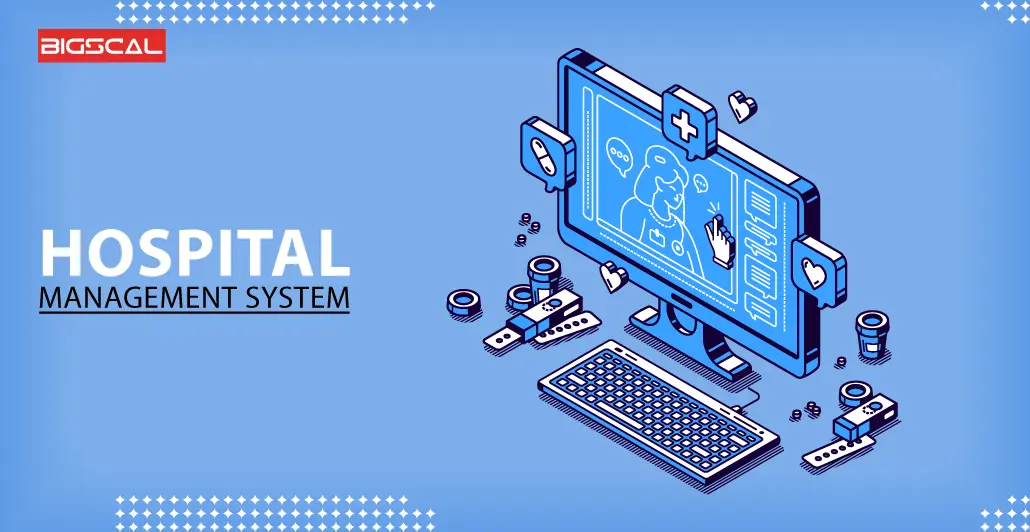
Bigscal’s Hospital Management System software stands as a cutting-edge solution in the healthcare industry. We offer a multitude of benefits to medical institutions.
Firstly, it streamlines administrative tasks, allowing hospitals to manage patient records, schedule appointments online, and billing efficiently. It not only saves time but also reduces the margin for error.
Secondly, the system enhances patient care through features like Electronic medical record. It provides quick access to patient histories, prescriptions, and treatment plans. This results in more accurate diagnoses and personalized care.
Moreover, Bigscal’s system emphasizes security, ensuring the confidentiality of patient data through robust encryption. It can also control access by complying with industry standards and regulations.
Additionally, our company supports seamless integration with existing healthcare technologies, mobile devices, apps and platforms. Hence, it promotes interoperability and makes data sharing across departments effortless.
Furthermore, the system’s user-friendly interface and comprehensive training options make it accessible for healthcare staff of all levels.
In summary, Bigscal offers most user-friendly hospital management software development. We provide a holistic solution that improves efficiency, patient care, and data security. Moreover, it also promotes integration and ease of use within healthcare institutions.
Conclusion
The quest for the best hospital management software is a crucial decision for healthcare institutions. This comprehensive guide has shed light on the critical factors to consider when making this choice. From scalability to security and user-friendliness, each element plays a vital role in hospital operations and patient care.
The right hospital management software helps to streamline administrative tasks, ensures data security, and promotes interoperability. Ultimately, selecting hospital management software carefully not only improves operational efficiency but also enhances the quality of patient care. Hence, it is an investment with far-reaching benefits for healthcare providers and the individuals they serve.
FAQ
What medical billing software system do most hospitals use?
Most hospitals commonly use Electronic Health Record (EHR) software systems for managing patient data and healthcare records.
Which model is best for a hospital management system?
The best hospital management software depends on the specific needs of the hospital. Some popular models include cloud-based systems, on-premises solutions, and integrated healthcare information systems.
What operating systems do hospitals use?
Hospitals typically use a variety of operating systems, including Windows and Linux. These are common choices for server infrastructure and Windows and macOS for administrative and user-end tasks.
What are PM systems in healthcare?
PM systems in the healthcare sector refer to Practice Management systems. These systems help healthcare providers manage administrative tasks like scheduling, billing, and patient registration to streamline operations.
What systems do hospitals use?
Hospitals use a range of systems to manage different aspects of healthcare delivery and operations, including:
- EHR (Electronic Health Record) systems,
- Laboratory Information Systems (LIS),
- Radiology Information Systems (RIS), and
- Hospital Information Systems (HIS).
